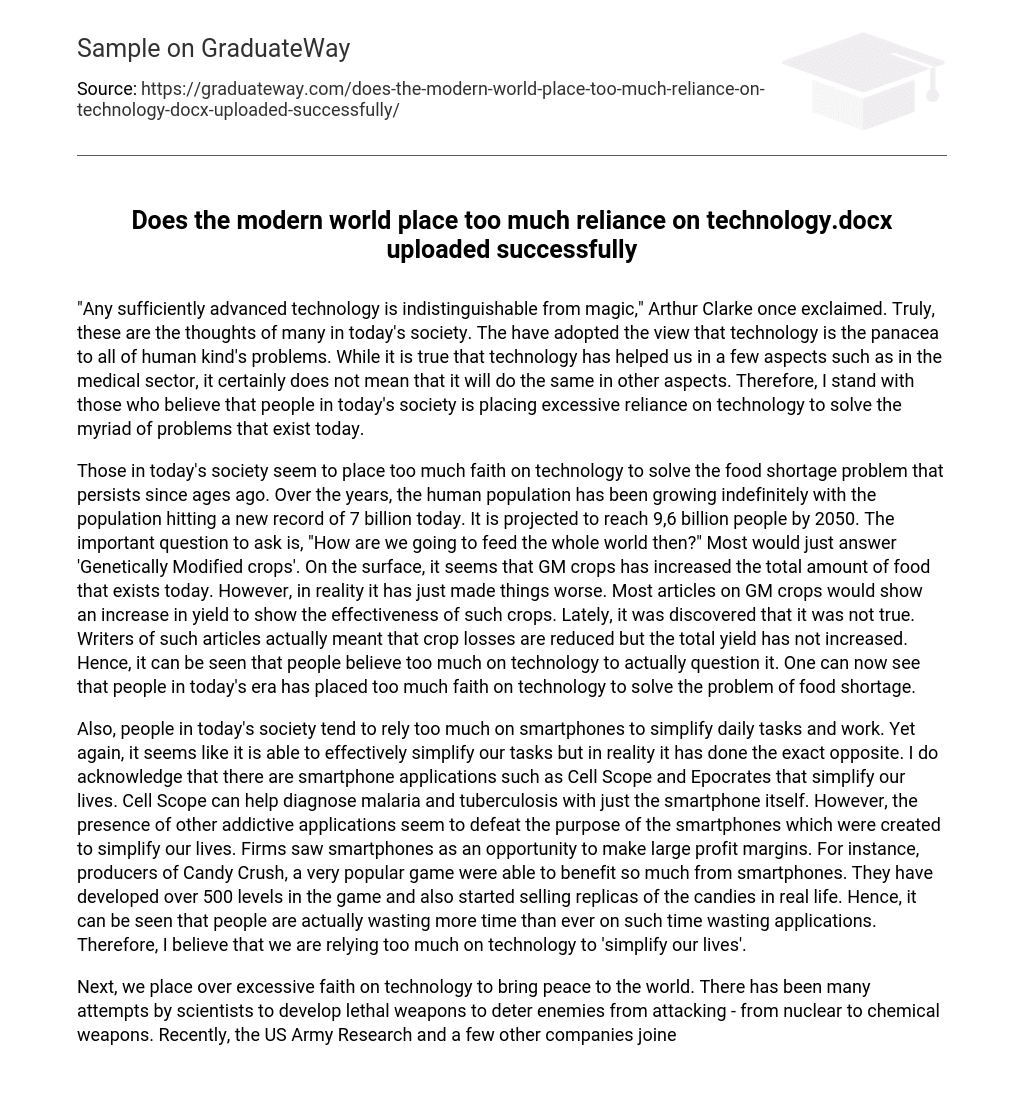“Any sufficiently advanced technology is indistinguishable from magic,” Arthur Clarke famously stated, capturing the beliefs of many individuals today. Society has fully embraced the idea that technology holds the ability to solve all of humanity’s issues. Although it has undeniably been a great help in areas like medicine, this belief does not hold true for everything. Hence, I align myself with those who argue that modern society excessively depends on technology to confront the wide range of challenges we face presently.
The heavy reliance on technology in addressing food shortage is a prominent characteristic of today’s society. With the global population currently at 7 billion and projected to reach 9.6 billion by 2050, the issue of feeding everyone becomes crucial. Genetically Modified (GM) crops are often seen as a potential solution to this challenge. However, recent findings have challenged the belief that GM crops significantly contribute to overall food supply. While improved yields are frequently cited as evidence of their effectiveness, it has been uncovered that these improvements primarily stem from reduced crop losses rather than an actual increase in total yield. This highlights an excessive trust in technology without critically examining its true capabilities and underscores society’s overreliance on technology as a remedy for food shortages.
In today’s society, smartphones have become a widely used tool for simplifying daily tasks and work. However, despite the appearance of making life easier, smartphones actually have the opposite effect. While certain smartphone applications like Cell Scope and Epocrates are valuable in diagnosing diseases such as malaria and tuberculosis, the presence of addictive apps undermines their intended purpose. Companies recognized the profit potential in smartphones, as shown by Candy Crush, a popular game with over 500 levels that has even expanded into selling real-life versions of its candies. As a result, people now spend more time on these time-consuming apps. This illustrates our excessive reliance on technology to simplify our lives.
It is evident that our society excessively relies on technology to achieve world peace. Scientists have developed weapons of mass destruction, such as nuclear and chemical arms, to deter enemies. Recently, the US Army Research and several companies collaborated to create the Tactical Assault Light Operator Suit (TALOS), also known as the ‘Iron Man Suit’. This suit has remarkable capabilities like bulletproofing and superhuman strength. While it deters attacks, concerns arise about this technology falling into wrong hands, particularly terrorists’. If this occurs, warfare and significant devastation would inevitably follow. Deploying advanced weaponry would result in losses for all parties involved and cause unimaginable destruction. Therefore, relying too much on these technologies is unwise as they could potentially become the very weapons that devastate our planet.
Although modern technology is becoming more prevalent, our control over our lives remains intact. Despite the advancements in technology, we still highly cherish human emotions and relationships in today’s society. These essential aspects of being human cannot be fulfilled solely by relying on technology. Love and affection, which are deeply desired by every individual, are still beyond the capabilities of current technology. As a result, we are not overly reliant on technology to meet our basic human needs. However, there may come a point when technology becomes so advanced that it dominates and overwhelms our lives.
Although there have been advancements in sports technology, such as attempts to replace umpires and referees with robots, relying too heavily on technology in sports has caused problems. These robots were not reliable when it came to judging matches because they couldn’t handle exceptions or differentiate between different fouls during a game. As programmed beings, their actions were predictable and they might have given a red card for any tackle made in a soccer game without considering the nuanced differences in fouls. Therefore, it is crucial for humans to make these decisions. This is why referees continue to play an important role in sports like basketball and badminton, ensuring that gameplay remains fair. In order to maintain fairness in sports and avoid excessive dependence on technology, humans strike a balance with it.
In general, I believe that modern society remains excessively dependent on technology. This reliance encompasses a range of creations, from the basic and enjoyable uses like fans for staying cool to advanced innovations like nuclear weapons for defense. However, I do recognize the existence of individuals who oppose technology and strive to live without it, despite its widespread presence. These individuals adhere to the notion that “Technology never solves one problem without creating ten more.” Nonetheless, I believe that we should exercise caution in relying too heavily on technology, as it has demonstrated its unreliability on certain occasions.





